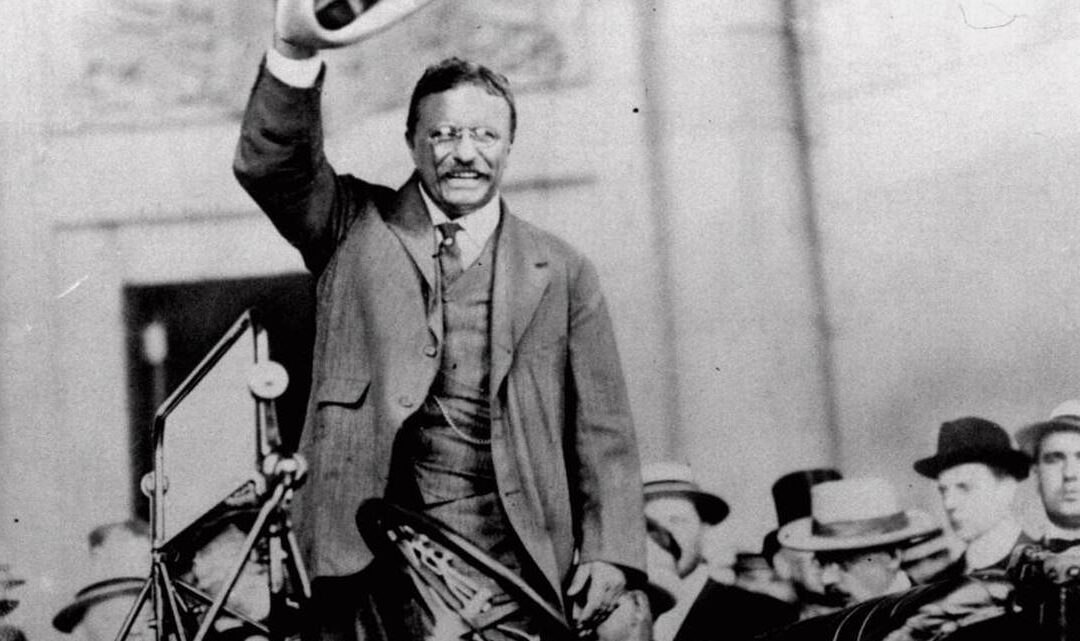Words have power.
This is the belief that has powered the Speech a Week series. There are many fine speeches that have captured the attention of the audience, inspired action and reverberated through the years. But few speeches punch quite so much power into every word as this one. The Man in the Arena is just such a piece.
An Appeal to Character
Theodore Roosevelt manages to strike a chord, marking a moment in history, and speaking with such power and eloquence that his words have been used and re-used many times, in various circumstances since they were originally uttered on 23 April 1910, in Sorbonne, France. The Man in the Arena is the passage where Roosevelt unleashes a forceful style of rhetoric – to cap off a rational argument and stir the emotions of those he seeks to persuade.
Imitation is said to be the highest form of flattery. Perhaps we can also include allusion, quoting, mis-quoting, outright plagiarising, replicating and paraphrasing. By this standard, the Man in the Arena is much loved indeed. Here are some of the many re-applications of Roosevelt’s words:
- Brene Brown in her TED talk Why your critics aren’t the ones who count and her book Dare to Lead
- Miley Cyrus’ tattoo
- A TV commercial selling Cadillac’s (which does not seem to attribute the words to Mr. Roosevelt in the ad, but he can be found in the credits as one of the actors after the voiceover artist)
- Liam Hemsworth’s tattoo
- Before the 1995 World Cup, Nelson Mandela gave a copy of the passage to Francois Pienaar, captain of the South African rugby team—and they won, defeating New Zealand
- Quoted by Richard Nixon in his resignation speech
- The wall of my son’s martial arts gym in Sydney Australia (and probably many others in and outside the US)
What makes Roosevelt’s words so ubiquitous, more than a hundred years later?
An appeal to character is at the heart of his message. It is an eloquent and erudite version of ‘just do it’. It is a Carpe Diem-esque rallying cry against complacency. And, it is an ethical appeal to all to do what is right and just. The Man in the Arena is a stirring passage that inspires the listener to be a better version of themselves. What greater purpose could a collection of words possibly have?
The Speech and the Excerpt
The Man in the Arena is the title given to one powerful paragraph within a much longer speech entitled; Citizenship in a Republic. Both are worthy of attention. Here is the oft-quoted power para, where every word matters:
It is not the critic who counts; not the man who points out how the strong man stumbles, or where the doer of deeds could have done them better. The credit belongs to the man who is actually in the arena, whose face is marred by dust and sweat and blood; who strives valiantly; who errs, and comes short again and again, because there is no effort without error and shortcoming; but who does actually strive to do the deeds; who knows the great enthusiasms, the great devotions; who spends himself in a worthy cause; who at the best knows in the end the triumph of high achievement, and who at the worst, if he fails, at least fails while daring greatly, so that his place shall never be with those cold and timid souls who know neither victory nor defeat.
A Speech a Week Series
Words have the power to change the world. Speeches are used by leaders, revolutionaries and evangelists to persuade people to think differently, to feel something new and to behave in remarkable ways.
In this series, we will examine one notable speech per week. We hope to cast a wide net – including politicians, business leaders, preachers, entertainers and philosophers. These articles will consider matters of content and style to uncover the secrets of oratorical success.
By examing the components of speechcraft we can improve our own powers of persuasion. We will come to appreciate the craft of eloquence – guarding against silver-tongued miscreants whilst gradually building our own expressive capability.
If you would like to contribute to the series by suggesting a speech, please send us a message via the mojologic website.


